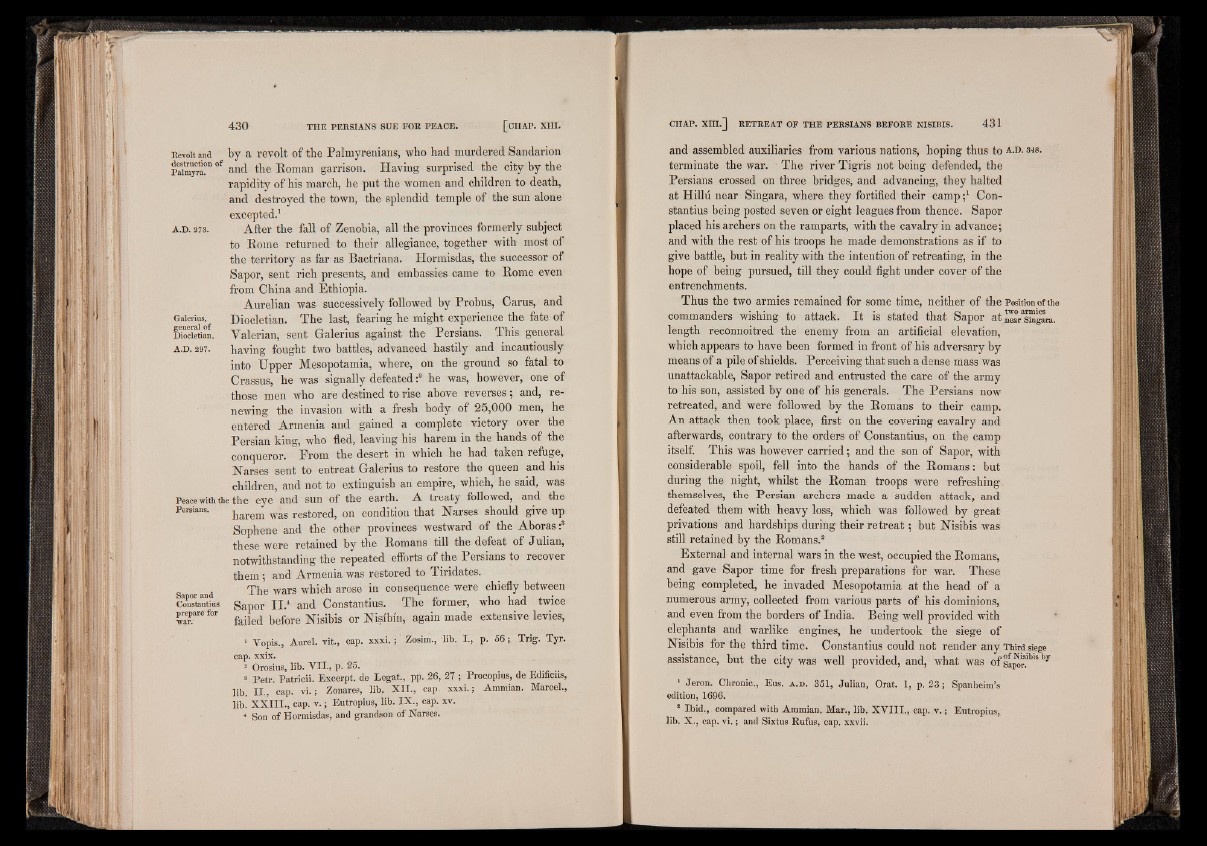
Revolt and by a revolt of the Palmyrenians, who had murdered Sandarion
Mmyra?“°f and the Eoman garrison. Having surprised the city by the
rapidity of his march, he put the women and children to death,
and destroyed the town, the splendid temple of the sun alone
excepted.1
a.d. 273. After the fall of Zenobia, all the provinces formerly subject
to Rome returned to their allegiance, together with most of
the territory as far as Bactriana. Hormisdas, the successor of
Sapor, sent rich presents, and embassies came to Rome even
from China and Ethiopia.
Aurelian was successively followed by Probus, Carus, and
Gaierius, Diocletian. The last, fearing he might experience the fate of
Diocletian. Valerian, sent Gaierius against the Persians. This general
a.d. 297. having fought two battles, advanced hastily and incautiously
into Upper Mesopotamia, where, on the ground so fatal to
Crassus, he was signally defeated:2 he was, however, one of
those men who are destined to rise above reverses; and, renewing
the invasion with a fresh body of 25,000 men, he
entered Armenia and gained a complete victory over the
Persian king, who fled, leaving his harem in the hands of the
conqueror. Prom the desert in which he had taken refuge,
Narses sent to entreat Gaierius to restore the queen and his
children, and not to extinguish an empire, which, he said, was
Peace-with the the eye and sun of the earth. A treaty followed, and the
Persians. ^ rem was restored, on condition that Narses should give up
Sophene and the other provinces westward of the Aboras:3
these were retained by the Romans till the defeat of Julian,
notwithstanding the repeated efforts of the Persians to recover
them; and Armenia was restored to Tiridates.
Sa or and The wars which arose in consequence were chiefly between
ConTtantius g ap0r H.4 and Constantius. The former, who had twice
prepare for failed before JSfisibis or Nisibiu, again made extensive levies,
1 Vopis., Aurel. vit., cap. xxxi. ; Zosim., lib. I., p. 5 6 ; Trig. Tyr.
cap. xxix.
8 Orosius, lib. V II., p. 25. t,,... ..
3 Pe tr. Patricii. Excerpt, de Eegat., pp. 26, 27 ; Procopius, de Editions,
lib. I I ., cap. v i . ; Zonares, lib. X I I ., cap, xxxi.; Ammian. Marcel.,
lib. X X I I I ., cap. v . ; Eutropius, lib. IX ., cap. xv.
4 Son of Hormisdas, and grandson of Narses.
and assembled auxiliaries from various nations, hoping thus to a .d . 348.
terminate the war. • The river Tigris not being defended, the
Persians crossed on three bridges, and advancing, they halted
at Hillu near Singara, where they fortified their camp;1 Constantius
being posted seven or eight leagues from thence. Sapor
placed his archers on the ramparts, with the cavalry in advance;
and with the rest of his troops he made demonstrations as if to
give battle, but in reality with the intention of retreating, in the
hope of being pursued, till they could fight under cover of the
entrenchments.
Thus the two armies remained for some time, neither of the Position of the
commanders wishing to attack. It is stated that Sapor at nea/singara.
length reconnoitred the enemy from an artificial elevation,
which appears to have been formed in front of his adversary by
means of a pile of shields. Perceiving that such a dense mass was
unattackable, Sapor retired and entrusted the care of the army
to his son, assisted by one of his generals. The Persians now
retreated, and were followed by the Romans to their camp.
An attack then took place, first on the covering cavalry and
afterwards, contrary to the orders of Constantius, on the camp
itself. This was however carried; and the son of Sapor, with
considerable spoil, fell into the hands of the Romans: but
during the night, whilst the Roman troops were refreshing,
themselves, the Persian archers made a sudden attack, and
defeated them with heavy loss, which was followed by great
privations and hardships during their retreat; but Nisibis was
still retained by the Romans.2
External and internal wars in the west, occupied the Romans,
and gave Sapor time for fresh preparations for war. These
being completed, he invaded Mesopotamia at the head of a
numerous army, collected from various parts of his dominions,
and even from the borders of India. Being well provided with
elephants and warlike engines, he undertook the siege of
Nisibis for the third time. Constantius could not render any Third siege
assistance, but the city was well provided, and, what was ofs!jSfbisby
1 Jeron. Chronic., Eus. a .d . 351, Julian, Orat. 1, p. 2 3 ; Spanheim’s
edition, 1696.
2 Ibid., compared with Ammian. Mar., lib. X V I I I ., cap. v . ; Eutropius,
lib. X., cap. v i.; and Sixtus Rufus, cap. xxvii.